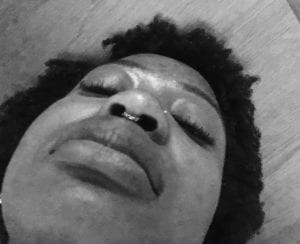Akiera Xavina Charles
Groundation Grenada
St. George’s, Grenada
Being in Grenada was very uncomfortable for me. I felt my privilege everywhere I went … The dotish old man finally stared at his daughter’s face after fifteen years of absenteeism violently streaked across his face. He ran to his 30 year-old girl friend, frantically looking for his wash towel the obeah woman blessed the day before. After all, she warned him that I was coming back full of vengeance. Meanwhile afraid to touch or hug me, my father instead stare at she-me-her-they at the airport; through me he saw all the woman he ever womanized and cheated on.

Even with my mashed-up-Southern-drawl-meets-New-York-Black-millennial-slang (with a touch of Caribbean somewhere in between), I felt unable to fully fit in there – Grenada. Either my too-glammed-up attire, iPhone, or my double nose piercings gave me away as a foreigner or indicated my class. Eventually I ended up blaming “my American citizenry” for this unwarranted exotification and attention attached with being a Black foreigner able to “move.”
Sometimes I would feel the eyes of those secondary school girls zoom in on me when I walked pass the Andall shopping center in town. I guess they’re just taking note of my sunglasses, shoes, lipstick, demeanor, and face, but still I felt uncomfortable knowing that I was the center of their attention.
However, now looking back unto my experience in Grenada, the most difficult part initially was revealing to my family and other Grenadians my reasons for coming there. Instead leaving them with roundabout answers, mentioning in drips and drops about something: “women,” “community,” and “organizing work,” I usually left most conversations feeling deceptive and “fake.” In my heart they knew and I knew that my sojourn back to Grenada meant something more, besides doing quaint community organizing work.
For some reason, the words “women loving women” and “lesbian” hid in the deepest part of my mouth too frightful to make any grand appearances. Yet, one day I noticed it came out in whimpers, after my cousin’s eyes decidedly spoke its same language. I was shock that we spoke our desires through our eyes, it almost felt too dangerous – too R rated for that house. Eventually, I realized her mom understood our shared language; patiently she waited for the truth to part ways through my mouth, but fortunately it never did.
I miss her eyes … round …oh … very round full of our truths
shhhh … Don’t tell them you saw our many liberations through her eyes.
After the dotish old man realized that his daughter was interning for and staying with another Grenadian woman who is an advocate for LGBTQ+ rights in Grenada, something in his head finally clicked; no longer was this man dotish. Fear gripped his eyes when he first encountered Malaika Brook-Smith Lowe. From then on, he knew what we were – zamies.

With the days leading up to my workshops, spent liming (hanging out) and feverishly making lesson plans after lesson plans worrisome thoughts began to tie up my mind. As result, I ended up feeling super awkward during my collaborative yoga/afro-futurism film screening workshop with the co-founder of Groundation Grenada, Malaika.
Since all eyes were on me as I waited for my “magical facilitating skills” to come alive, I instead felt my lips quiver from nervousness as I read aloud parts of Alexis Pauline Gumbs’s short story in Octavia’s Brood. When four minutes passed with me still reading from the book, I was sure everyone had lost interest in everything I was saying – becoming blah…blah …blahhh.
In this case, having thought that cultural barriers were what made it difficult for me to explain afro-futurism to the audience, I later on realized that perhaps my initial facilitating style was to blame. My readings came off “too teacher-like” and “jargony.” Now reminiscing on what writing friend from NYC pointed out to me on the phone, I reckon how this writing series became successful after I made it more organize, interactive and relatable (yay).

Akiera Xavina Charles. As a senior in Gallatin School of Individualized Study, Akiera is concentrating in “Understanding How Visionary Futurism and Spatial Geography Shapes the Afro-diasporic Imaginary.” While describing herself as an Afro-Caribbean, queer mango-loving, soon to be landscape architecture with a knack for throwing shade on “Whiteness,” as well as, documenting the dreams and desires of Afro-diasporic folks, Akiera on the side also likes to write Black Feminist manifestos and cook vegan food.
